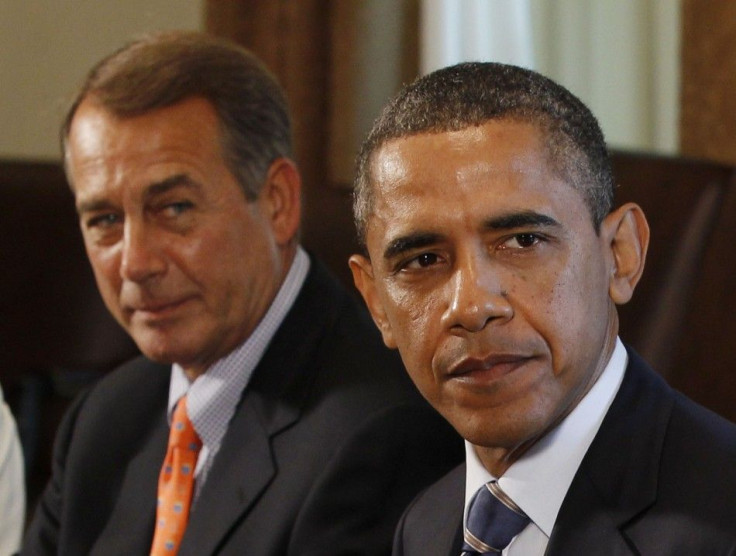Analysis: Obama, Boehner face more tests of uneasy ties

They bonded over golf, bickered over debt, and now President Barack Obama and House of Representatives Speaker John Boehner face even more tests of an uneasy relationship critical to a functioning government.
America's two most powerful politicians drew fire from their backers in reaching an 11th-hour compromise on Sunday that barely averted a U.S. government debt default.
Along the way, Obama and Boehner developed a better understanding of each other, but they are no closer to seeing eye to eye on a host of issues, aides for both men say.
Obama and Boehner will find it hard to reach a future compromise because of a sharply polarized political divide in which neither side is willing to give in, especially ahead of the 2012 elections.
Round two comes this fall when Democrats and Republicans begin to negotiate what should be included in a $1.2 trillion deficit reduction package.
Obama, a Democrat under pressure from liberals to protect social programs, wants increased taxes to be part of the picture to ease the pain of spending cuts.
Boehner, the top Republican, wants only spending cuts and no new taxes, adhering to the hardline position of conservatives in his party, whose support he needs to remain as speaker.
They batted these issues back and forth in hours of conversations, with Obama accusing Boehner of twice backing out of a deal at the last minute and refusing to return a phone call. In turn, Boehner accused Obama of demanding additional concessions when they were close to a deal.
Senate Republican leader Mitch McConnell later emerged as a key Republican voice in crafting the debt deal.
Obama told Democratic supporters in Chicago on Wednesday that the debt battle was only a sign of things to come, making the 2012 presidential election in which he is seeking a second term perhaps more important than the 2008 contest.
"We're going to have a lot of work to do, and it's going to be tough. And this week I think signifies not only how tough it's going to be but exactly what's at stake," he said.
TEA PARTY PRESSURE
Experts compare the Obama-Boehner relationship to that of Republican President Ronald Reagan and Democratic Speaker Tip O'Neill in the 1980s.
Reagan and O'Neill reached deals on taxes and Social Security and developed friendly ties without jettisoning their principles.
What is different now, said Linda Fowler, a professor of government at Dartmouth College in New Hampshire, is that Boehner is under pressure from conservative Tea Party House Republicans to cede no ground.
"O'Neill didn't have that," she said.
Long-stalled trade deals with Colombia, Panama and South Korea and an extension of a payroll tax cut are examples of areas where the two sides could seek agreement this year.
There is a sense in the White House that Republicans could have a powerful incentive to help because they recognize that Americans are angry over the debt standoff and may blame the party if the U.S. economy does not improve.
Stock markets around the world fell sharply over the past week, partly on concerns the United States might slip back into recession. Some of those fears dissipated on Friday when the Labor Department reported that jobs growth had accelerated more than expected in July.
Overall, the debt-ceiling battle, featuring plenty of partisan name-calling in Washington, diminished the images of both Obama, 50, and Boehner, 61.
The White House thinks Boehner is more like the mainstream Republican lawmakers Obama served with in the Illinois state legislature, but that Tea Party pressure has limited his ability to reach across the partisan line for a compromise.
"He is somebody you can talk to and try to deal with, understanding that he has limited power," said a Democratic aide familiar with the closed-door discussions over raising the debt ceiling. "He has a limited ability to negotiate on behalf of the body he represents. You know that going in."
From Boehner's perspective, there is mutual respect and trust between him and Obama, but the speaker was disappointed the president was unwilling to agree to larger reductions in the budget deficit.
"He got frustrated when the president wasn't as serious as he had hoped in doing something meaningful on debt and deficits," a Republican aide said. "Their relationship is more a product of the necessity than necessarily a personal bond."
A July 28-August 1 survey by Pew Research/Washington Post, found that about a third of respondents said they had developed a "less favorable view" of each man in recent weeks. Fewer than 20 percent said their view of either became "more favorable."
© Copyright Thomson Reuters 2024. All rights reserved.




















